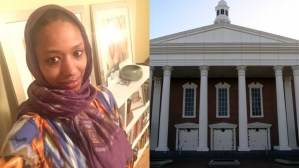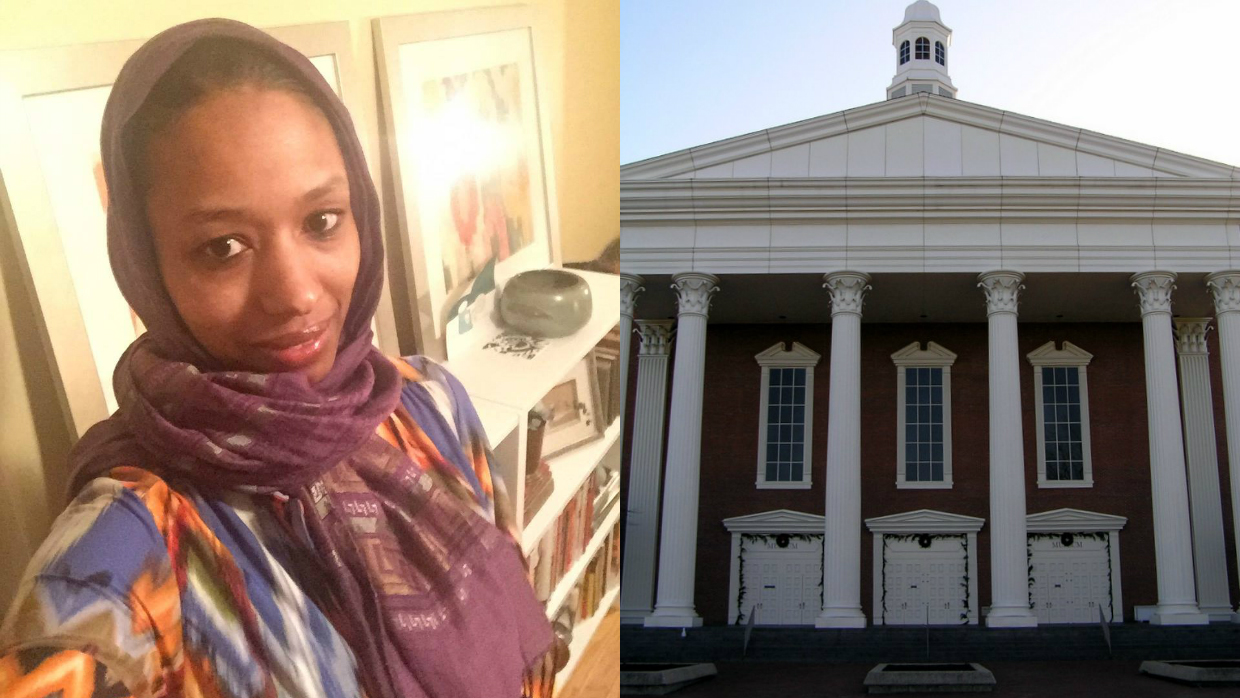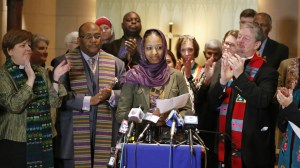In this series

Update (Jan. 4, 2016): Wheaton College has begun termination proceedings against Larycia Hawkins.
—–
Update (Dec. 17): Wheaton College and Larycia Hawkins are holding their ground, while Miroslav Wolf weighs in.
—–
A tenured Wheaton College political science professor who pledged to wear a hijab during Advent in support of her Muslim neighbors has been placed on administrative leave. Not for donning the Islamic head covering, but over "significant questions regarding the theological implications" of her explanation of why she was doing so.
“Wheaton College faculty and staff make a commitment to accept and model our institution’s faith foundations with integrity, compassion, and theological clarity,” the college stated in announcing the decision. “As they participate in various causes, it is essential that faculty and staff engage in and speak about public issues in ways that faithfully represent the college’s evangelical Statement of Faith.”
Larycia Alaine Hawkins, an associate professor who has taught at Wheaton since 2007, announced last week that she’d don the traditional headscarf as a sign of human, theological, and embodied solidarity.
“I stand in religious solidarity with Muslims because they, like me, a Christian, are people of the book,” she wrote in a Facebook post on December 10. “And as Pope Francis stated last week, we worship the same God.”
Hawkins also sought approval for her actions from the Council on American Islamic Relations, a sometimes controversial Muslim advocacy group.
Her comments made headlines, but also led to criticism from other evangelicals.
“This statement is unbelievable,” tweeted Baptist blogger Denny Burk, professor of biblical studies at Boyce College in Louisville. “Really jaw-dropping.”
“A holy kiss to you who disavow the idea that Muslims & Christians worship the same God: I love you. Peace & respect,” Hawkins tweeted in response to her critics. She linked to her Facebook response, where she stated:
Whether or not you find this position, one held for centuries by countless Christians (church fathers, saints, and regular Christian folk like me), to be valid, I trust that we can peacefully disagree on theological points and affirm others like the Triune God (albeit there are differences here as well–Athanasian Creed, anyone?), the virgin birth (or Immaculate Conception depending on your persuasion), and the Resurrection. Let there be unity in our diversity of views about all of the above.
Hawkins pointed to a 2011 Huffington Post op-ed from Yale theologian Miroslav Volf to bolster her claim.
She also linked to a 2011 CT interview with Volf on whether Muslims and Christians worship the same God.
Volf told CT that “all Christians don't worship the same God, and all Muslims don't worship the same God. But I think that Muslims and Christians who embrace the normative traditions of their faith refer to the same object, to the same Being, when they pray, when they worship, when they talk about God. The referent is the same. The description of God is partly different.”
Wheaton College said the disciplinary action was taken not because Hawkins was wearing a hijab, but "in response to significant questions regarding the theological implications of statements that [Hawkins] made about the relationship of Christianity to Islam." Hawkins will receive “the full review to which she is entitled as a tenured faculty member,” the college stated.
“The College has no stated position on the wearing of headscarves as a gesture of care and concern for those in Muslim or other religious communities that may face discrimination or persecution,” said Wheaton president Philip Ryken. “We support the protection of all Americans including the right to the free exercise of religion, as guaranteed by the Constitution of the United States.”
Earlier this month, Wheaton's student newspaper published an open letter in response to comments made by Jerry Falwell Jr., president of Liberty University, who urged his students to get conceal carry permits for handguns in order to “end those Muslims.” Falwell later clarified that he was referring to Muslim terrorists.
Wheaton students called Falwell’s remarks unchristian.
“We, therefore, reject the ideology espoused by Chancellor Falwell in his recent remarks to the Liberty student body,” they wrote, “and we invite you to stand in solidarity with our Muslim brothers and sisters who share our human dignity.”
Wheaton responded to the students' letter, stating, "While Islam and Christianity are both monotheistic, we believe there are fundamental differences between the two faiths, including what they teach about God’s revelation to humanity, the nature of God, the path to salvation, and the life of prayer." The college noted:
Faculty and student expressions of concern about the treatment of Muslims have been grounded in a desire to live peaceably and respectfully with all people, including our neighbors of Islamic and other religious faith traditions. While these commitments are consistent with our Statement of Faith and Community Covenant, overtures of Christian friendship must be enacted with theological clarity as well as compassion.
The debate over whether Christians and Muslims worship the same God is a perennial one. The question topped CT's most-read stories of 2002 and top questions of 2014.
One debate: Can churches share worship spaces with Muslims? It took place in 2011, after Heartsong Church in Cordova, Tennessee, allowed members of a nearby mosque to hold Ramadan prayers in the church building. (The Muslim congregation’s new building was not completed in time for the Muslim holy season.)
Jason Hood, then a scholar in residence at Christ United Methodist Church in Memphis, argued that allowing Muslim prayers in a church could cause harm to non-Christians.
“The theological issues at play come down to whether Jesus' love command also requires leaders to avoid causing undue stumbling; or, as Wesley put it, the command to do good works includes avoiding causing or leading others to harm, whether they are believers or unbelievers,” he wrote. ”Does facilitation of false worship violate the love command?"
Heartsong pastor Steve Stone defended his congregation’s actions. He said that the church made it clear that there are difference between Christian and Muslim beliefs.
But he worried about claims that Muslims—because they reject the Trinity—are idolaters.
“I wonder if people who say that would make the same charge against Jews who also do not accept Jesus as the Messiah,” he wrote. “The Muslims with whom I share relationships of love and trust tell me they worship the same God I do and the Jews do. According to my faith, they cannot do it to the fullest because Jesus is the full revelation of God—God in flesh and blood. But who am I to say that they do not worship the one true God according to their understanding?”
The debate flared again between Duke University and Franklin Graham in January 2015.
In a 2002 CT cover story, Baptist theologian Timothy George also considered the question of whether Muslims and Christians worship the same God.
"Is the Father of Jesus the God of Muhammad? The answer is surely Yes and No," he wrote. He continued:
Yes, in the sense that the Father of Jesus is the only God there is. … Christians and Muslims can together affirm many important truths about this great God—his oneness, eternity, power, majesty. … But the answer is also No, for Muslim theology rejects the divinity of Christ and the personhood of the Holy Spirit—both essential components of the Christian understanding of God. … Apart from the Incarnation and the Trinity, it is possible to know that God is, but not who God is.
In 2008, CT looked at whether shared monotheism is the best starting place for Muslim-Christian dialogue.
Editor's note: This story has been updated to clarify Hawkins's social media comments.
[Larycia Hawkins image courtesy of Facebook]
[Wheaton College image courtesy of Stevan Sheets / Flickr]













